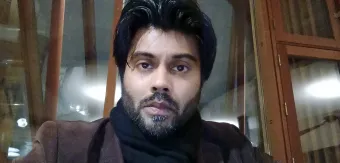The link between health and security as scientific aggression forms new battlefield

The link between health and security as scientific aggression forms new battlefield
It was a cold January 2020 morning in London. Having spent the previous two weeks digesting the assassination of Qasem Soleimani and the downing of Ukraine International Airlines Flight 752, I had a sense of dreaded fear.
These events were mere appetizers for what was to come. And so 18 months on, those fears have been realized. We are none the wiser on how to chart our way out of this pandemic; however, one thing is for certain: This pandemic has weakened our global security architecture. And if events in Afghanistan do not serve as a reminder, then humanity's mea-culpa moment might be too late.
By definition war is an extension of politics by other means. Whether we so choose to admit it, COVID-19 has increased its political currency exponentially, at the same time devaluing the guiding principles of humanity by politicians and organizations hell-bent on dodging blame and holding onto power.
So, based on this, we are indeed at war. This, my friends, is World War III. It is mutually assured destruction (MAD) based on a level of apathy second to none.
The World Health Organization declared COVID-19 a Public Health Emergency of International Concern on Jan. 30, 2020. Their reluctance to declare it speaks to an insouciant tone of ignorance, incompetence and mere disregard for the tenets of human survival and security for which it is trusted.
Even the Ebola czar, Professor Peter Piot of The London School of Hygiene and Tropical Medicine (LSHTM), was left dumbfounded, commenting that WHO made the declaration too late. The LSHTM and WHO have long enjoyed a rich history of collaboration, with many notable alumni serving at the highest levels of the WHO, so his comments should be viewed with the impartiality that they deserve.
So the war wages on; man against virus, racing against the clock so that entire populations are not wiped from the face of the planet.
At the time of this writing, COVID-19 has claimed the lives of 4.55 million people. Could this pandemic be the turning point for global conflicts, or could it be the reinvention that we so truly dread?
That reinvention was realized with the rapid and mind-boggling withdrawal of allied forces from Afghanistan. The technical expertise available to the allied forces seemed to have fallen on deaf ears, or were conveniently silent. We watched the withdrawal in horror, ignorant to the fact that a rapidly mutating virus is still in circulation.
As the world seems convinced and divided at the same time as to the origins of COVID-19, focusing our intense conspiracy desires to everything and anything China-related, the Russians are certainly enjoying this schadenfreude moment, which will soon pave the way for them, China, Turkey and Pakistan to lead the charge for Taliban legitimacy and usher in a new wave of global recognition, the likes of which we have never seen before.
If the International Monetary Fund (IMF) and World Bank have a shared agenda of Taliban reformation, they might be in for the shock of their lives. Afghanistan has provided China with a golden opportunity to fulcrum its expertise and technology to vanguard any South East Asian security apparatus. That vanguard, together with support from Russia, Turkey and Pakistan, will clear the way for other regional partners to shift away from western alliances and seek audience with a more domestically aligned alliance, one that seeks to portray a local understanding of the Asian continent.
The new alliance of an Australia-US-UK nuclear submarine pact continues to turn the knife in the back of France, making other EU countries wary of any transatlantic sympathies and protection from future Russian aggression. Could this be a foreign policy pivot towards China and Russia, one the west has secretly harbored but never publicly disclosed?
The magnitude of fear and shock that resides in global leaders from whom we have come to seek some measure of solace and comfort seems to accelerate with global conflicts. This pandemic could further exacerbate regional divisions, across all political systems by those who seek financial gain, as well as deepening the inequalities and paranoia that drive these conflicts — or it could also be the start of new conflicts shaped by the parameters of biological and scientific aggression the likes of which this planet has not seen yet.
Dr. Sanjay Pooran is a specialist in infectious disease and public health. He is a fellow at The Geneva Centre for Security Policy and explores the intersection between security, global health and terrorism.
This article has been first published on Florida Today.
Disclaimer: The views, information and opinions expressed in the written publications are the authors’ own and do not necessarily reflect those shared by the Geneva Centre for Security Policy or its employees. The GCSP is not responsible for and may not always verify the accuracy of the information contained in the written publications submitted by a writer.
Dr. Sanjay Pooran is a specialist in infectious disease and public health. He is a fellow at The Geneva Centre for Security Policy and explores the intersection between security, global health and terrorism.
